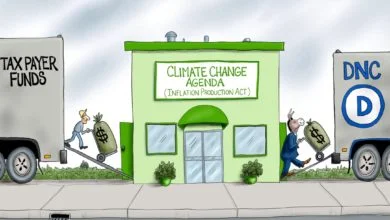Here’s How A Political Crisis Over Climate Can Lead To A Real Solution

The 2019 Nobel Prize for Chemistry went to three scientists — John B. Goodenough, M. Stanley Whittingham, and Akira Yoshino — for their work on lithium-ion batteries. Today, these batteries enable our entire digital-mobile culture.
It’s interesting to reflect back on where the initial impetus for better batteries came from.
“In the early 1970s, during the oil crisis, Prof. Whittingham worked on fossil-fuel-free energy technologies,” The Wall Street Journal reported. Indeed, back then, Whittingham’s co-recipients were also active in the same research area.
Ah yes, the oil crisis, also known as the energy crisis, of the ’70s. That crisis provides a sort of mirror image of today’s climate-change crisis. Back then, we were told we were running out of carbon-based energy. Today, we have plenty of carbon energy, but now we’re being told we are running out of atmospheric “storage capacity” for the byproduct of that energy, carbon dioxide.
In both eras, the ’70s and the ’10s, the message aimed at ordinary people has been the same: We have to cut back, make do with less, otherwise the end is nigh.
“U.S. oil supplies will last only 20 years. Foreign supplies will last 40 or 50 years, but are increasingly dependent upon world politics,” The Bulletin of the Atomic Scientists declared in May 1972. For good measure, the Bulletin added, “Natural gas is as short as oil.”
Even during the depths of the so-called energy crisis, real people, as they went about their daily lives, never paid much heed to the doomsayers. And why not? Because they didn’t have to. In the ’70s, U.S. energy consumption never fell for any significant period of time. That is, in 1970, the U.S. used up 67.8 quadrillion British Thermal Units (quads); in 1975, it consumed 72 quads, and in 1980, it was 78.1 quads.
It’s worth noting, however, that the political repercussions of the energy crisis were profound. Ronald Reagan won a big victory in 1980 in no small part because he pledged to “unleash” American energy production. And he did. Today, America consumes nearly a quarter more energy than it did when the Gipper was first elected.
Indeed, over the last four decades, we solved the energy crisis in two ways: We learned to produce more—most notably because of natural-gas fracking — and we learned to consume energy more efficiently; gasoline mileage in cars, for instance, has more than doubled in the last four decades.
Yes, there were some boondoggles along the way, such as Jimmy Carter’s Synthetic Fuels Corporation, and Barack Obama’s Solyndra. And yet the overall record speaks for itself: We innovated our way out of the energy crisis.
Indeed, we also have in our back pockets, as it were, the potential to develop vastly more carbon-based energy, in the form of methane hydrates; these are frozen methane molecules locked inside ice crystals on frigid ocean bottoms across the world. The U.S. Department of Energy, established in 1977, funded the early R&D on methane hydrates. Today, D.O.E. estimates that global methane hydrates total some 20,000 trillion cubic meters; that’s a lot of energy, and also, for what it’s worth, that’s a dollar number to be measured in the quadrillions. So if the U.S. could ever harvest even a tiny fraction of its methane hydrates, we’d not only be more energy independent, but also a lot more rich.
But enough of energy abundance. Let’s get back to the climate-change crisis. How shall we address that if “climate-believers” are in charge? By cutting back? By making do with less? Americans heard that before in the ’70s, and they didn’t like it. They might care about the climate, and yet that doesn’t mean they’re going to accept a lower standard of living.
In other words, any incumbent leader or party that seeks really to cut back on CO2 will soon enough hit a crisis. And that political crisis will quickly lead to a crash technological effort, as politicians seek to innovate their way out of a jam. Yes, the windy speeches, and the colorful demonstrations, will all continue, and yet the real action will be financial, as hard-pressed pols cut checks to be cashed by scientists, inventors, entrepreneurs, and anyone else who seems to have a half-way plausible solution.
Is such crash spending wasteful? Sure it is. It’s the government, after all. And yet as we saw with the energy crisis, an all-out effort — including public officials, private cronies, and brainy scientists — has a way of getting the job done. As Lenin said of big efforts, quantity has a quality all its own.
Maybe the answer will be dramatically improved solar power. Or maybe it will be bladeless windmills. Or maybe it will be robust carbon capture, which will enable, ironically enough, the continued mass-consumption of carbon fuels. Or maybe it will be extracting the energy from carbon fuels while they’re still in the ground, so the carbon dioxide never has a chance to escape into the atmosphere.
But there will be some sort of technological fix, because few politicians want to face re-election after delivering less. As history tells us, the political crisis of today leads to the technological solution of tomorrow.
And along the way, we might even get some cool new batteries.
The views and opinions expressed in this commentary are those of the author and do not reflect the official position of the Daily Caller News Foundation or Conservative Daily News.
Content created by The Daily Caller News Foundation is available without charge to any eligible news publisher that can provide a large audience. For licensing opportunities of our original content, please contact licensing@dailycallernewsfoundation.org



